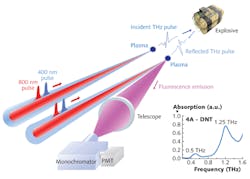TERAHERTZ DETECTION: Terahertz remote sensing uses 'all-optical' fluorescence manipulation technique
Although many time-domain terahertz-wave detection techniques have been developed, high ambient-moisture absorption rules out "remote" terahertz sensing, shutting out a host of applications in homeland security, astronomy, and environmental monitoring. But finally that picture is changing, thanks to a new all-optical technique from researchers at Rensselaer Polytechnic Institute (RPI; Troy, NY) and Laval University (Quebec City, QC, Canada).1
Laser-induced fluorescence
The key is the exploitation of omnidirectional fluorescence emission that interacts directly with a terahertz wave. The signal-detection method is sensitive enough to temporally resolve terahertz pulses at standoff distances up to 10 m with minimal water-vapor absorption and unlimited directionality.
An ultraviolet (UV)-coated telescope and a spectrometer collect and measure laser-induced nitrogen fluorescence from a plasma at remote distances. Irradiation of nitrogen atoms by intense laser pulses causes a portion of excited electrons to be trapped in high-lying Rydberg states of atoms and molecules. A single-cycle terahertz pulse causes the atoms in those trapped states to be more easily ionized, causing terahertz radiation-enhanced emission of fluorescence (THz-REEF).
By using a two-color (fundamental and second-harmonic) laser pulse to asymmetrically ionize the gas, the researchers control the electron-drifting velocity in the laser-induced plasma and thus coherently manipulate the fluorescence emission from plasma that interacts with terahertz waves. The relative optical phase between the fundamental laser pulse and second-harmonic laser pulse, which is controllable with attosecond accuracy, is set to create asymmetrical electron drifting. The time-resolved THz-REEF waveforms (obtained by measuring fluorescence emission as the time delay between the terahertz pulse and optical pulses is continuously changed) are measured when the electron-drift velocity is parallel and antiparallel to the terahertz polarization direction, respectively. The difference between these two waveforms is linearly proportional to the time-dependent terahertz field (terahertz time-domain waveform). Amplitude and phase information of the terahertz pulse can be extracted from the fluorescence signal simultaneously.
Standoff spectra
Using the THz-REEF technique, high-resolution broadband spectra of water vapor and 4-Amino-2, 6-dinitrotoluene (4A-DNT) were obtained from 0 to 7 THz and 0 to 1.5 THz ranges, respectively. The 4A-DNT spectra compared favorably with electro-optic sampling, wherein an electro-optic crystal (300 µm thick <110> gallium phosphide) is used to measure the time-domain terahertz waveform via the Pockels effect. Due to the absence of intrinsic phonon absorption and Fabry-Perot effect, this technique is able to provide broadband and high-resolution spectroscopy signatures.
"With sufficient laser power, the combination of this terahertz-wave remote-sensing technique and previously demonstrated terahertz-wave generation at long distances using a two-color laser beam with stable control of the relative phase, would realize remote terahertz spectroscopy for the identification of chemical biological agents," says professor X.-C. Zhang, J. Erik Jonsson '22 Professor of Science and the director of the Center for Terahertz Research at RPI. "Moreover, this offers a promising way to characterize electron behavior in strong light-matter interactions by revealing the detailed interplay process of strong-field ionization, plasma dynamics, and terahertz-wave-induced electron heating."
Zhang adds, "The great challenge of terahertz-wave remote sensing in ambient conditions is the strong water-vapor attenuation at terahertz frequencies. High atmospheric transparency of the UV fluorescence enables remote sensing; we are excited to achieve this without worrying about the humidity anymore."
REFERENCE
1. J. Liu et al., 2010 CLEO Postdeadline paper CPDB8, San Jose, CA (May 2010).

Gail Overton | Senior Editor (2004-2020)
Gail has more than 30 years of engineering, marketing, product management, and editorial experience in the photonics and optical communications industry. Before joining the staff at Laser Focus World in 2004, she held many product management and product marketing roles in the fiber-optics industry, most notably at Hughes (El Segundo, CA), GTE Labs (Waltham, MA), Corning (Corning, NY), Photon Kinetics (Beaverton, OR), and Newport Corporation (Irvine, CA). During her marketing career, Gail published articles in WDM Solutions and Sensors magazine and traveled internationally to conduct product and sales training. Gail received her BS degree in physics, with an emphasis in optics, from San Diego State University in San Diego, CA in May 1986.
